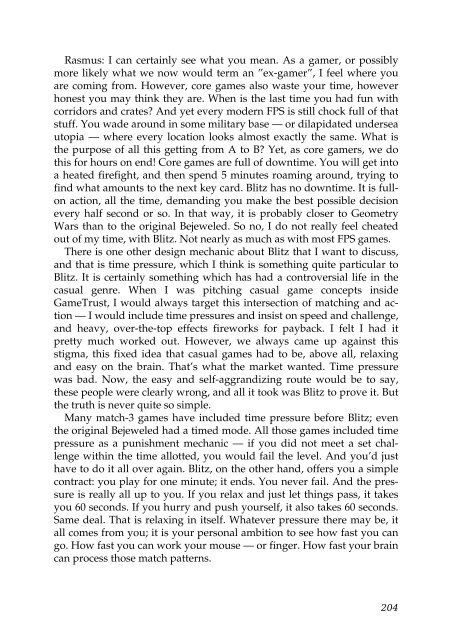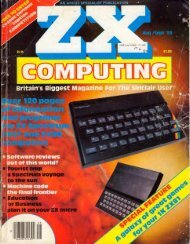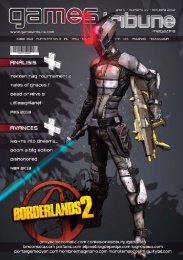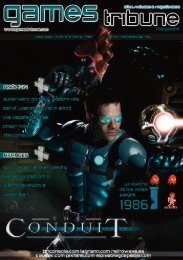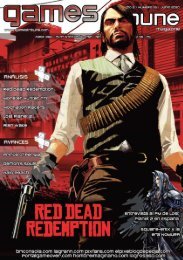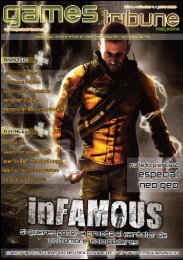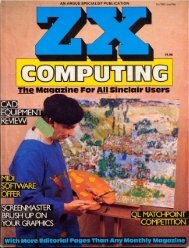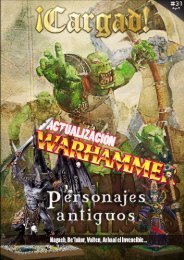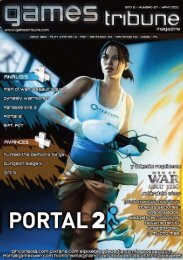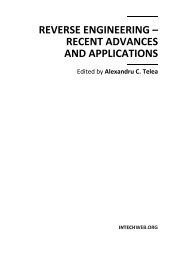Well Played 2.0: Video Games, Value and Meaning - OpenLibra
Well Played 2.0: Video Games, Value and Meaning - OpenLibra
Well Played 2.0: Video Games, Value and Meaning - OpenLibra
Create successful ePaper yourself
Turn your PDF publications into a flip-book with our unique Google optimized e-Paper software.
Rasmus: I can certainly see what you mean. As a gamer, or possibly<br />
more likely what we now would term an ”ex-gamer”, I feel where you<br />
are coming from. However, core games also waste your time, however<br />
honest you may think they are. When is the last time you had fun with<br />
corridors <strong>and</strong> crates? And yet every modern FPS is still chock full of that<br />
stuff. You wade around in some military base — or dilapidated undersea<br />
utopia — where every location looks almost exactly the same. What is<br />
the purpose of all this getting from A to B? Yet, as core gamers, we do<br />
this for hours on end! Core games are full of downtime. You will get into<br />
a heated firefight, <strong>and</strong> then spend 5 minutes roaming around, trying to<br />
find what amounts to the next key card. Blitz has no downtime. It is fullon<br />
action, all the time, dem<strong>and</strong>ing you make the best possible decision<br />
every half second or so. In that way, it is probably closer to Geometry<br />
Wars than to the original Bejeweled. So no, I do not really feel cheated<br />
out of my time, with Blitz. Not nearly as much as with most FPS games.<br />
There is one other design mechanic about Blitz that I want to discuss,<br />
<strong>and</strong> that is time pressure, which I think is something quite particular to<br />
Blitz. It is certainly something which has had a controversial life in the<br />
casual genre. When I was pitching casual game concepts inside<br />
GameTrust, I would always target this intersection of matching <strong>and</strong> action<br />
— I would include time pressures <strong>and</strong> insist on speed <strong>and</strong> challenge,<br />
<strong>and</strong> heavy, over-the-top effects fireworks for payback. I felt I had it<br />
pretty much worked out. However, we always came up against this<br />
stigma, this fixed idea that casual games had to be, above all, relaxing<br />
<strong>and</strong> easy on the brain. That’s what the market wanted. Time pressure<br />
was bad. Now, the easy <strong>and</strong> self-aggr<strong>and</strong>izing route would be to say,<br />
these people were clearly wrong, <strong>and</strong> all it took was Blitz to prove it. But<br />
the truth is never quite so simple.<br />
Many match-3 games have included time pressure before Blitz; even<br />
the original Bejeweled had a timed mode. All those games included time<br />
pressure as a punishment mechanic — if you did not meet a set challenge<br />
within the time allotted, you would fail the level. And you’d just<br />
have to do it all over again. Blitz, on the other h<strong>and</strong>, offers you a simple<br />
contract: you play for one minute; it ends. You never fail. And the pressure<br />
is really all up to you. If you relax <strong>and</strong> just let things pass, it takes<br />
you 60 seconds. If you hurry <strong>and</strong> push yourself, it also takes 60 seconds.<br />
Same deal. That is relaxing in itself. Whatever pressure there may be, it<br />
all comes from you; it is your personal ambition to see how fast you can<br />
go. How fast you can work your mouse — or finger. How fast your brain<br />
can process those match patterns.<br />
204


